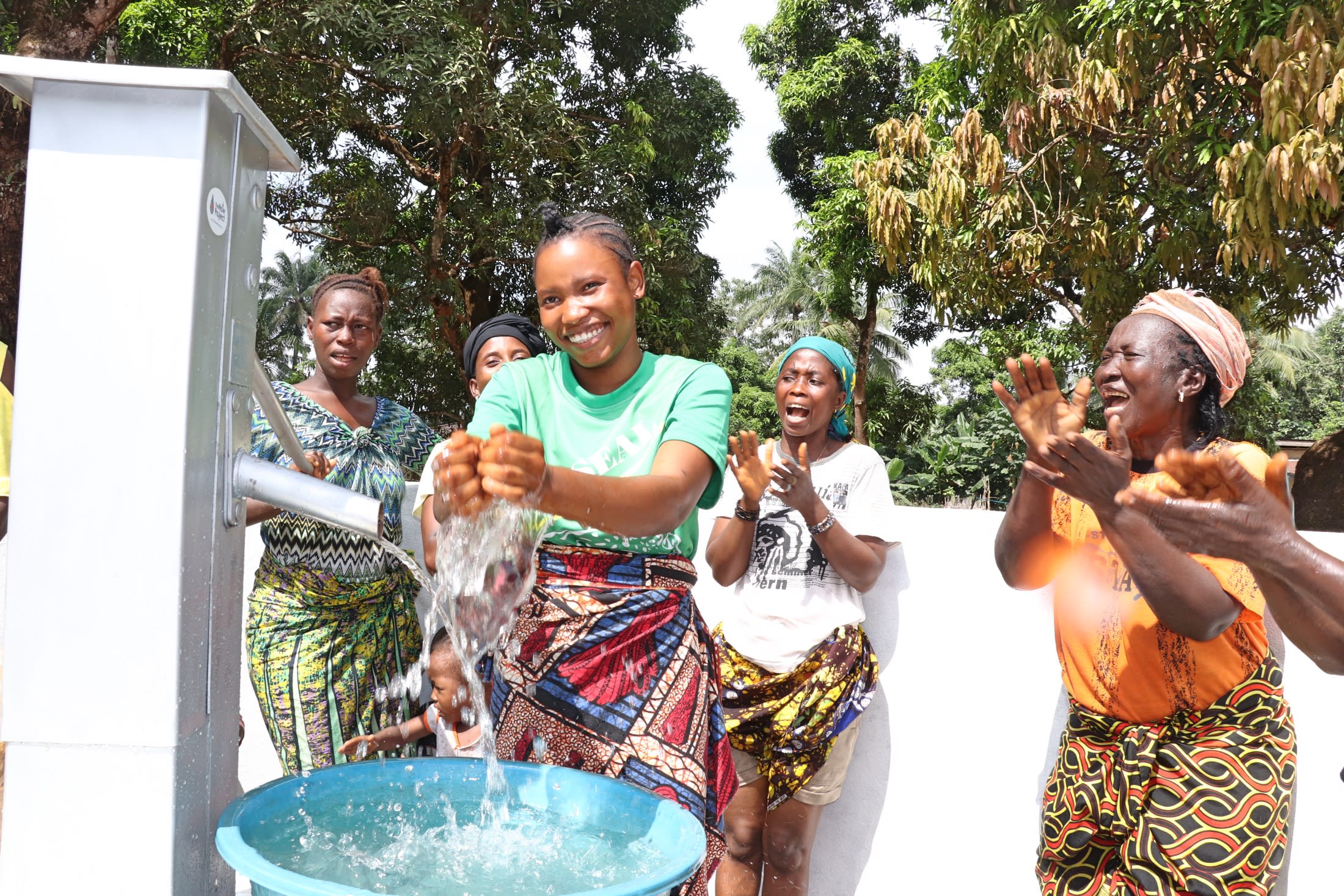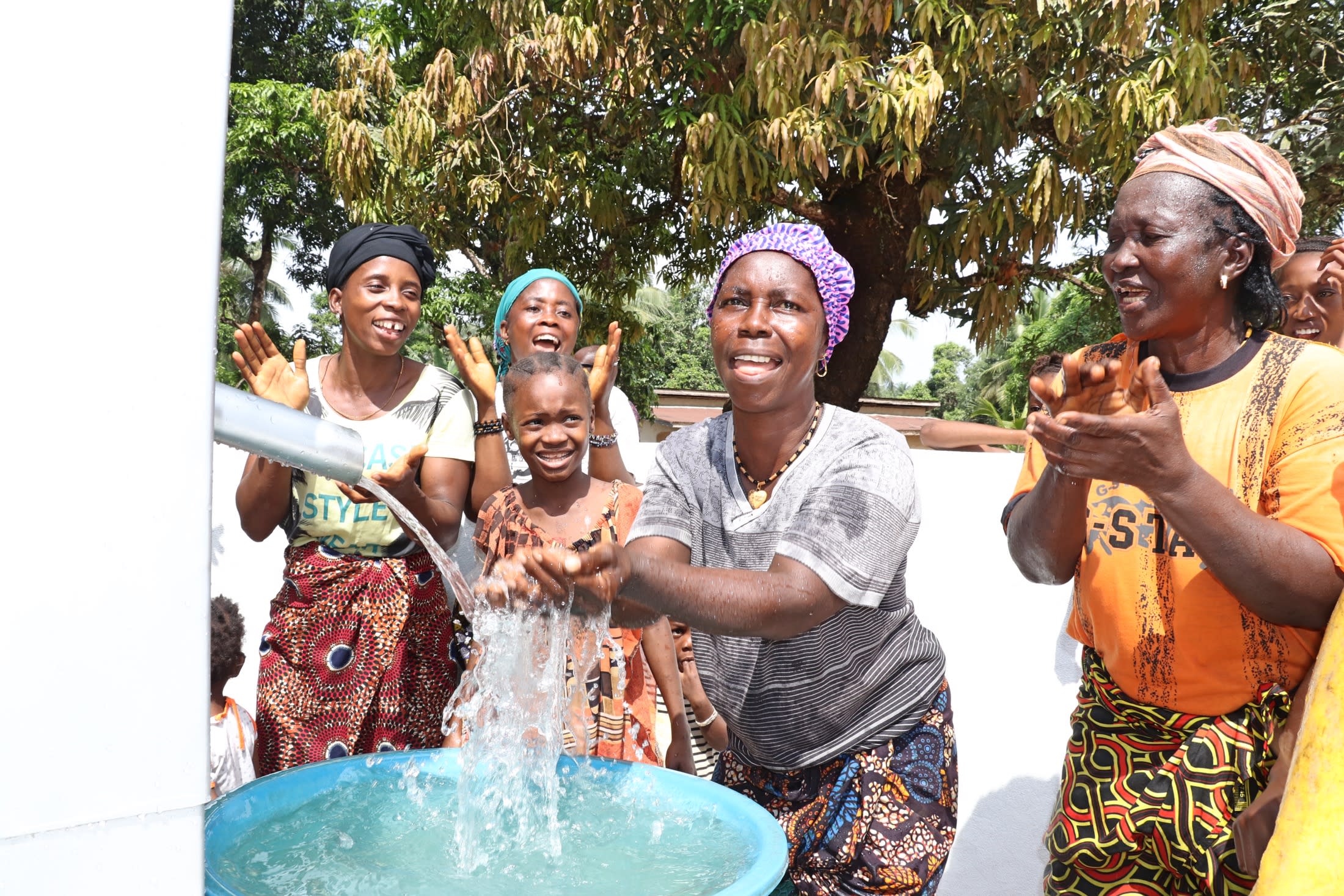The only protected source of water in Korobana is severely overworked due to the high demand in this community of 292 people. Because of the strain on the well, it breaks down frequently, leaving people to fetch water from a hand-dug well in the local swamp.
With only one real water source in Korobana and everyone needing water, both waterpoints usually sport long lines full of impatient people. At least the water from the main well can be used right from the pump (when the pump is working). But the swamp water requires a lot of time and patience. Lately, the water in the swamp well has been dwindling so much that water-fetchers get muddy, silty water.
"Honestly, the present water situation in this community is not easy for me," said 15-year-old student, Fatmata F. (in the below photo).

"The reason for the challenges I normally face whilst fetching water is that our main source of fetching water is faulty. Fetching water from this source is very difficult since I must use a rope and attach it to the container. That is not all: whilst fetching water, one is expected to bend down and draw water from the swamp well. It takes a lot of time to draw water, especially when the water at the swamp gets less. Also, whenever the water in the swamp begins to reduce in quantity, it becomes dirty.
"During such situations, I would not be able to fetch water for my parents, except I go in search of water from other neighboring villages. The time spent just going in search of water is great. This is really a burden for me because failing to do so would make my parents punish me. That is why I would sacrifice my time just to fetch water, so that I would be able to please them. Walking far distances and carrying heavy water on my head has affected me. I normally experience pain in my neck and joints."
 "I am really affected by the water situation in this community," said 39-year-old local trader Adama Kamara (in the above photo).
"I am really affected by the water situation in this community," said 39-year-old local trader Adama Kamara (in the above photo).
"Since our main source of fetching water became non-functional, I have been fetching water from the swamp. The water at the swamp sometimes changes in color due to [contamination]. This makes it impossible for me to fetch water for cooking and drinking. Most times, I would exercise patience for sedimentation to take place. This would take over an hour. The long waiting time hinders me from doing other work at home, such as cooking, laundering, and washing the dishes and pots."

"[Laundry] is done mainly on Saturday, yet it is hard to do, especially with the present water situation in this community," Adama continued.
"During Saturday, the [swamp] would be jampacked with people. This makes it virtually impossible for me to fetch water. It's very challenging during such situations. The water [lowers] to the point that it cannot even fill one container of water. Since I have no choice, I wait till the water starts to rise. This really delays me. Most times, I would just launder [a] few clothes and keep the rest for the other week.
"Likewise, the water crisis in this community hinders my trade. This is because I would not be able to get the required amount of water I need. Whenever this happens, I would not be able to bake [my] bread at home. Even if I tried to manage the water, it would not be enough, because clean water is needed to do the mixing of the flour, sugar, and yeast. As a result, I get less income due to the small amount of bread I normally produce."
And if wasted time and money weren't enough, the scarce, contaminated water also costs community members their hygiene and, subsequently, their health.
"Truly speaking, good hygiene can only be maintained with sufficient water," Adama continued.

"Unfortunately for me, cleaning my house and the latrine is a difficult task to do. This is mainly because of water. I need to sweep, mop, and dust the furniture at home. This task requires a lot of water for it to be done. Due to the water constraints, I deliberately neglect some of these duties. That is why I would be very grateful if the main source of fetching water is always functioning. I believe all the water constraints I used to experienced would now become a thing of the past."
"This work should have been much easier if our main source of fetching water is always working," Fatmata concluded. "Therefore, all these water challenges I am presently facing would be over."
Here’s what we’re going to do about it:
Well Rehabilitation
The well marked for this overhaul is dry for a few months every year and needs major work to supply adequate, clean water to the community year round. The pump will be removed, and a hand auger will be lowered inside and powered by a drill team. This hand auger will allow the team to drill several meters deeper to hit a sufficient water column that will ensure the well supplies water throughout all seasons.
As the team drills, casing will be installed, transforming the bottom of this hand-dug well into a borehole. PVC piping will connect this lower system directly to the pump, a construction that we know will also improve the quality of water.
Once this plan is implemented, everyone within the community will have access to safe drinking water in both quality and quantity, even through the dry months.
Hygiene and Sanitation Training
There will be hygiene and sanitation training sessions offered for three days in a row.
After our visit, the hygiene and sanitation trainer decided it would be best to teach community members how to build a tippy tap (a hand-washing station built with a jerrycan, string, and sticks). They will use these tippy taps for handwashing demonstrations, and will also teach about other tools like dish racks and the importance of properly penning in animals.
These trainings will also strengthen the water user committee that manages and maintains this well. They enforce proper behavior and report to us whenever they need our help solving a serious problem, like a pump breakdown.


































